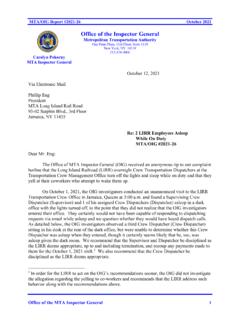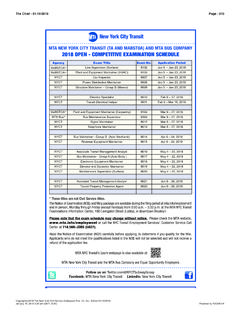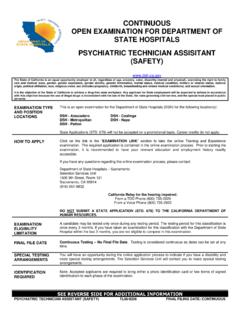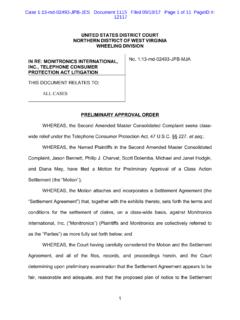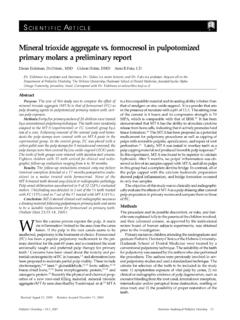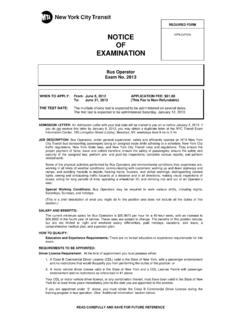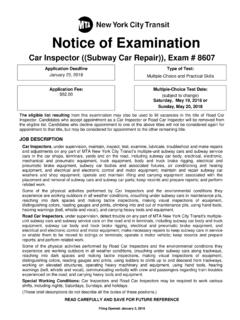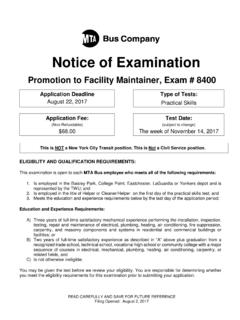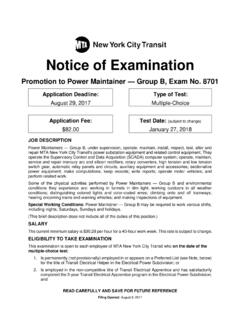Transcription of Background Verification MTA/OIG #2003-28L
1 1 Background Verification MTA/OIG #2003-28L OIG investigated an anonymous allegation that a NYC Transit Light Maintainer falsified his qualifications when he applied for his job in order to gain employment. OIG found no evidence that the Light Maintainer intentionally falsified his qualifications, though there were discrepancies in his start and end dates for previous job experience. OIG did find that while the employee didn t falsify his qualifications, the experience he did have - through no fault of his own and unbeknownst to him - was insufficient for the position for which he was hired. The requisite experience level listed for the position asked for four years of full-time experience as a journeyman level electrician, or fewer years and the equivalent experience in class work; however, the term journeyman was not defined in the job listing.
2 OIG found that the employee had never served at a journeyman level in the past, and determined that he was hired in spite of this because of several reasons. First, without a definition of journeyman in the job listing, the employee was left to make assumptions as to whether he possessed the requisite experience. Second, NYC Transit does not verify prior work experience and education unless there is negative information supplied by the candidate for hourly positions, which the job was. OIG recommended that in cases where journeyman level experience is required for the position, NYC Transit should provide a clear definition of what constitutes such experience in the notice of examination . OIG also recommended NYC Transit verify any and all Background information if such information is significant to the consideration of the applicant.
3 Identification Fraud MTA/OIG #2003-34L OIG conducted an investigation into an allegation from NYC Transit s Human Resources department (HR) regarding a former NYC Transit conductor. The conductor, who had been in the criminal system, used his brother s identity, to pass a criminal record check for him. OIG substantiated these claims, determining that a lack of Verification on the part of NYC Transit made this possible. Multiple documents that are taken at various points during the pre-employment process are not compared to ensure the same person has completed all facets. OIG recommended barring both the conductor and his brother from any future employment with the MTA. OIG also recommended taking steps to ensure that multiple sets of fingerprints that are already collected be verified from the same person, and recommended taking a digital photo at the time the pre-employment test is taken to further ensure people cannot misrepresent themselves.
4 2 New York City Transit Items on eBay MTA/OIG #2004-1L OIG investigated the circumstances surrounding offers to sell NYC Transit property on eBay. This was referred to OIG by MTA Audit Services after an investigation of their own; Audit Services asked OIG to determine whether there was evidence of crime relative to the acquisition of the items. The referral led OIG to examine the approach taken by the various properties of the MTA to monitor eBay and other internet auction sites for MTA related items which may have security implications or may have been stolen. The OIG investigation found that NYC Transit was satisfactorily monitoring auction websites, as was the MTA Police. However, the other MTA properties did not monitor the sites at all. OIG therefore recommended the MTA agencies coordinate with MTA Police in order to establish a regular monitoring program for safety and security sensitive items; that the agencies themselves monitor such websites for potential stolen property.
5 OIG also recommended controlling the disposition of and the destruction of security sensitive printed documents, and reinforcing procedures for the return of identification cards, badges, keys, etc. from employees leaving MTA service. Capping Report on examination And Hiring Practices MTA/OIG #2004-2L This OIG report is an extension of several earlier investigations into the hiring practices of NYC Transit. It offers several recommended changes to the Civil Service hiring systems designed to strengthen areas susceptible to fraud. OIG does not mean to suggest that the hiring practices are fraudulent; however, there are certain circumstances that allow the opportunity for fraud, and have been abused in the past. One of the main recommendations was to verify fingerprint records from the time a competitive examination is taken with the subsequent set recorded at the time of hire.
6 OIG discovered several instances where said records did not match. Such a system has since been instituted and has already resulted in the termination of several employees whose print records do not correspond and the rejection of several prospective employees for the same reason. Another recommendation is the need to maintain and draw from a centralized pool of questions for each exam, as opposed to creating a new specific set of questions for each exam which may be more easily and accurately disseminated. This recommendation has already been implemented on a small scale, with plans for broader implementation anticipated in the future. 3 Alcohol Consumption by Contractor Employees MTA/OIG #2004-6L OIG launched an investigation based on allegations that a contractor s employees working on an elevated station platform in Brooklyn were consuming large quantities of alcohol during lunch breaks before returning to the worksite.
7 The investigation substantiated this allegation. When confronted with the evidence, the contractor in question promptly identified and questioned the workers, at which time they admitted their guilt and resigned from the project. OIG recommended NYC Transit reword their contracts to include a damages clause if a party is found to be in violation and to prohibit a contractor s guilty employees from working not only on the particular contracted project, but on any MTA related project. Additionally, NYC Transit officials demanded the quality of work by the workers in question be checked and confirmed. The contractor agreed to have the work inspected by a qualified inspector and invited NYC Transit officials to be present. Improving MTA New York City Transit s Practices Regarding Prospective Contractors and Sub-Contractors with Unpaid Tax Obligations MTA/OIG #2004-16L This OIG report outlines the practices of NYC Transit in awarding contracts to vendors with existing state and federal tax debts.
8 NYC Transit checks for tax liens, warrants, et al. on all contractors and sub-contractors for contracts over the amount of $1 million. This threshold is set because of the inherent man-hour and monetary cost of performing commercial Background checks on all contractors. OIG found several problems with this system. OIG discovered contractors were awarded relatively small contracts, despite having large tax debts. In some instances the tax owed was multiple times the amount of the contract. In some cases, notations included on the contractor report noting tax liens were lost in transit or missing from MTA files. The report outlines several recommendations for strengthening the MTA s ability to avoid doing business with vendors with outstanding tax debts including a pilot program to create a database of companies with outstanding tax liens, tax warrants, etc.
9 This program will be a multi-departmental program between the OIG and NYC Transit initially with plans to encompass all MTA agencies. 4In the interim, OIG recommends running electronic tax lien searches with standard Background checks on prospective contractors and setting a reasonably lower dollar threshold for this simple search. OIG also recommends a more thorough, commercial search for contracts valued at $1 million or greater. LIRR Bar Cart Improprieties MTA/OIG #2004-27L OIG investigated an anonymous complaint that a LIRR Bar Cart Attendant (BCA) improperly withheld the majority of his sales receipts submitted from two days of business from the LIRR. The investigation found on the whole, glaring faults within the system under which the BCAs are regulated, which left it susceptible to fraud. The OIG investigation concluded that the BCA s supervisor made repeated attempts to mislead and deceive the LIRR, in part by falsifying official forms indicating the lesser sales receipts were correct for the days in question.
10 Though the investigation was unable to locate the missing money and ascertain conclusively who may have taken the money, OIG determined that it is the supervisor who is responsible for the accuracies of the fraudulent reports. OIG recommended LIRR seek full restitution from the supervisor. OIG also recommended several measures to shore up the internal protections against such fraud, including: instituting a training program for BCAs, assigning oversight and auditing responsibilities to a group external to the BCA program, and clarifying policies and procedures for the handling and transferring of cash and receipts from BCAs. Monitoring and Enforcement Deficiencies at the MTA Office of Civil Rights Disadvantaged Business Program MTA/OIG #2004-30 OIG conducted an investigation of the MTA Office of Civil Rights (OCR) and their administration of the Disadvantaged, Minority, or Women Owned Business Enterprise program (D/M/WBE), which provides opportunities to businesses owned by the aforementioned groups.
